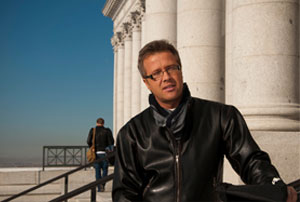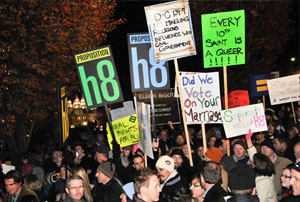For documentarian Reed Cowan, a gay man raised Mormon, taking on the LDS church became a different kind of mission
STEVEN LINDSEY | Contributing Writer stevencraiglindsey@me.com

CHANGING FOCUS | Cowan saw a bigger story when his film about Mormon gay youth kicked out of their homes opened up to a world of prejudice by the LDS church detailed in ‘8: The Mormon Proposition.’
Proposition 8: Only a marriage between a man and a woman is valid or recognized in California.
Getting a movie into the Sundance Film Festival is an honor in itself, but unexpected consequences always follow. For some, it’s fame and fortune.
For Reed Cowan, director of 8: The Mormon Proposition, it was death threats — a result that was especially surprising since the movie he ended up making was not the one he set out to film.
“I was raised in Utah in the Mormon church and to know that other young Mormon kids were being kicked out of their homes after coming out really pained me,” says Cowan on a recent trip to Dallas. “Ninety percent of the kids on the street in Salt Lake City in the dead of winter are gay kids. I thought, I have a camera and I can shine the light on that. So we started out to do a film about that.
“Then Proposition 8 began to bubble.”
Cowan planned his movie to touch on the initiative though he never anticipated Prop 8 would pass. Then the vote happened.
“So many of us woke up the next morning just feeling like, are you kidding? If we can’t win California, we can’t win anywhere. So many of us — gay or lesbian or people sympathetic to LGBT causes — were sickened by it,” he says. “In a figurative sense, if we were in a battle, I felt like I was sucker-punched and I looked around at my feet to see what stones I had to throw.”
As a response to the vote, Broadway singer-actor Sam Harris recorded a video blog that caught Cowan’s attention.
“He was so incensed because he’d just gotten married and was working to adopt a child and he did this vlog that was so eloquent and so beautiful,” says Cowan. “My God, here’s an artist who’s taking his resources, his music, his talent, his voice and he’s doing something about it the very next morning! What do I have at my arm’s length? I have a camera. I have friends who can edit. So that’s what I began to do.
It’s been an incredible journey.”
The film began sending shockwaves through the church before it was even completed. But perhaps the most amazing development for Cowan was the amount of information that was dropped in his lap — literally, as the box of documents that is one of the movie’s smokingest guns.
“A young man who worked in the LDS church archives came out of the woodwork and approached me directly. [His] father is very high up in the Mormon church and he was allowed access to things that most people aren’t.”
Cowan’s informant learned that high-ranking Mormons put together an internal study about gay and lesbian issues.
“It was 1,500 pages he copied and took off with. I have every one of them,” Cowan says. Those documents have since been submitted as evidence in the trial challenging Prop 8, which began closing arguments this week.
Cowan’s own life has faced destruction on multiple occasions, many directly attributable to his Mormon upbringing. When Cowan was doing his missionary work (which brought him to North Texas), he genuinely believed what he was preaching and he believes even now that many people within the church aren’t motivated by hate.
“Prop 8 wasn’t done with malice. Bigotry isn’t often done with malice. As one of the people who was in my film said to me, ‘But we do it with a smile,’” he laughs. “We do it with a smile! You don’t have to have malice and desire to go slash somebody’s throat to actually do things to destroy their lives.”
After getting married and having a son, Cowan’s wife left him and he finally came out. Today, he has adopted two children with a partner, Greg Abplanalp, whom he’s known since elementary school.
“In high school we had a relationship and one night in our small Utah town I was beaten almost to death, almost Matthew Shepard-style, where they stood over me in disgust, where they had taken me to finish me off. I lived, but my dad was so afraid that he sent me on a mission and told me I was never to talk to that boy again,” Cowan says. “And I didn’t for 13 years.”
Cowan even was counseled by a church leader to write a letter to Abplanalp condemning him, which he reluctantly did.
After reparative therapy, aversion therapy, visualization therapy and other approaches to “cure” him failed, Cowan approached another leader for guidance. That’s when he was told to marry a woman; it didn’t last long.
“I had been divorced a year, had my first relationship, got my heart broken,” he says. “I believe in karma and the person who’d broken my heart kind of just dumped and ran. I thought I was obviously experiencing the pain I caused somebody else.”
He learned that Abplanalp lived two blocks from him while he was married. Cowan wrote him an apology and they decided to meet. The two reunited and began raising Wesley, the boy born from Cowan’s marriage. Two years later, Wesley died in an accident.
“Greg saved my life after the death of my son. He’s the reason we built 25 schools in Africa for AIDS orphans in my son’s name. That’s why I fight,” he says of his decision to make the movie.
“Life taught us we’re braver and stronger and smarter than we ever thought we were,” he says. “But our little boys deserve to know that we’re a family and that the U.S. government sees us as a family and that if they’re going to define families by marriage, which I have my issues with, and give benefits to families that are married, then by damn, my kids deserve that. My kids deserve the same thing.”
It’s a fight he’s willing to pursue even though some want to stop him. Which is where the death threats come in.
“You wouldn’t believe the letters I’ve gotten from religious people,” Cowan says. “Three days ago, a guy calling himself ‘Christian4life’ wrote, ‘God took your son away from you because you’re a faggot. And your son would’ve had a horrible life and that’s why he died.’”
So many people bring his son’s death into their hate-filled letters that he’s made the agonizing decision to move his son’s body to a private grave.
But the film has generated positive feedback, too.
“I’ve had letters from gay people in their 70s that say, ‘Finally you lanced the wound, thank you.’” he recalls. “I’ve had gay kids as young as 12 and 13 contact me. I’ve had religious people say, ‘Thank you, you helped me see things differently.’”
His goal for the film is simple: A complete and total separation of church and state in our country.
“This movie is ultimately for the voter. Look at what happened with your sacred vote. Look at how the blurring of lines between church and state resulted in your sacred vote being used to achieve the objectives of a religion. And look at the danger of becoming a theocracy in history. Do we want a democracy or theocracy?” Cowan asks.
Ultimately, though, he hopes his film brings about change.
“Gay people are tough. We’re resilient. We learned to be from the time we’re in school. Most of us survive, God rest the ones who don’t,” he says. “We lay our own lives down and give our days in the service of kids who are growing up gay to make it better for them.”
………………………………………..
Infuriating brilliance
Reed Cowan’s emotionally charged and ultimately enraging documentary 8: The Mormon Proposition opens today at the Angelika Film Center, almost two years to the day after the first legal gay marriages occurred in California. It’s a fitting release date for a film that so candidly and energetically explores the LDS church’s role in reversing the decision to recognize same-sex marriages.
His 80-minute film delves into the bowels of the church to uncover a history of bigotry and exclusion. Cowan, who was raised Mormon and persecuted for being gay, frequently sought for the Mormon church to tell its side of the story, though he was mostly refused.
Cowan’s connections gained him access to hundreds of pages of private documents as revolting as they are incriminating. 8 is powerfully inspirational and should prompt every LGBT viewer to action, no matter where they previously fell on the subject of gay marriage. Even when it’s at its hardest to watch during scenes of overt condemnation and reenactments of the covert torture of homosexuals within the Mormon church, the revelation of such raw hatred and destruction is impossible to shake.
— S.L.
4 stars
Opens today at Angelika Mockingbird Station.
This article appeared in the National Pride edition in the Dallas Voice print edition June 18, 2010.













